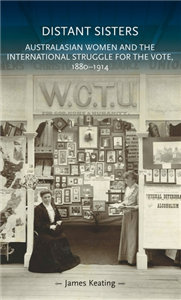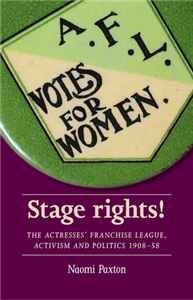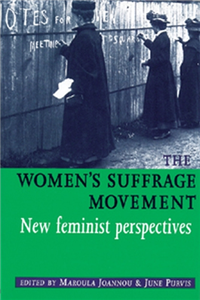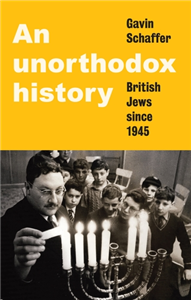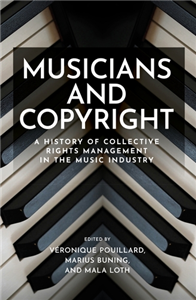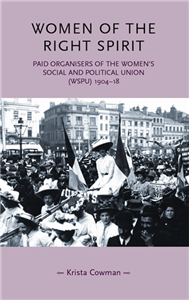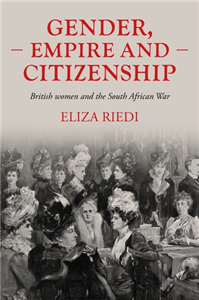Your Search Results
-
A Walk through History
A Walk Through History is a Russian publishing house specializing in children’s nonfiction. Since 2011 it has created and designed about 50 titles on various periods of history and other subjects such as mathematics, sport, plants and animals.
View Rights Portal
-
Promoted ContentHumanities & Social SciencesDecember 2022
Distant sisters
Australasian women and the international struggle for the vote, 1880–1914
by James Keating
In the 1890s Australian and New Zealand women became the first in the world to win the vote. Buoyed by their victories, they promised to lead a global struggle for the expansion of women's electoral rights. Charting the common trajectory of the colonial suffrage campaigns, Distant Sisters uncovers the personal and material networks that transformed feminist organising. Considering intimate and institutional connections, well-connected elites and ordinary women, this book argues developments in Auckland, Sydney, and Adelaide-long considered the peripheries of the feminist world-cannot be separated from its glamourous metropoles. Focusing on Antipodean women, simultaneously insiders and outsiders in the emerging international women's movement, and documenting the failures of their expansive vision alongside its successes, this book reveals a more contingent history of international organising and challenges celebratory accounts of fin-de-siècle global connection.
-
Promoted ContentThe ArtsNovember 2020
Stage rights!
The Actresses’ Franchise League, activism and politics 1908–58
by Naomi Paxton
Stage rights! explores the work and legacy of the first feminist political theatre group of the twentieth century, the Actresses' Franchise League. Formed in 1908 to support the suffrage movement through theatre, the League and its membership opened up new roles for women on stage and off, challenged stereotypes of suffragists and actresses, created new work inspired by the movement and was an integral part of the performative propaganda of the campaign. Introducing new archival material to both suffrage and theatre histories, this book is the first to focus in detail on the Actresses' Franchise League, its membership and its work. The volume is formulated as a historiographically innovative critical biography of the organisation over the fifty years of its activities, and invites a total reassessment of the League within the accepted narratives of the development of political theatre in the UK.
-
 Trusted Partner
Humanities & Social SciencesMay 2009
Trusted Partner
Humanities & Social SciencesMay 2009The Women's Suffrage movement
*New feminist perspectives*
by Maroula Joannou, June Purvis
Available in paperback for the first time, this important collection of essays illustrates the complexity, richness and diversity of the suffrage movement. Combining historical reappraisal with lively accounts of the culture of the women's suffrage movement, this volume offers a unique focus. It includes studies of the fascinating, but neglected groups that participated in the campaign: the Women's Franchise League; the Women's Freedom League; the Women's Tax Resistance League and the United Suffragists. This is accompanied by feminist research on the poetry, fiction and drama that emerged from women's struggle for the vote. In addition there are reappraisals of two leading figures in the Pankhursts' Women's Social and Political Union, an illuminating analysis of the relationship between suffrage and sexuality, and a discussion of what happened away from the metropolis, as well as of the little known campaign to extend the vote after 1918. ;
-
 Trusted Partner
May 2007
Trusted Partner
May 2007Briefe an Freunde
1942–1999
by Jürgen Teller, Hubert Witt, Johanna Teller, Hubert Witt, Johanna Teller
Jürgen Teller war ein außerordentlicher Briefschreiber. Die vorliegende Sammlung enthält Briefe an seine Familie, an Ernst und Karola Bloch und ihren Sohn Jan Robert; an Sigrid Damm, Volker Braun, Friedrich Dieckmann, an Freunde und Schüler. Die in den Briefen geäußerte Kritik an Politik und Gesellschaft der DDR und auch der Bundesrepublik beruht auf dem Glauben an die Unzerstörbarkeit humanistischer Traditionen. Jürgen Teller wurde 1926 bei Leipzig geboren. Nach Krieg und Gefangenschaft gaben Literatur und Philosophie und neue Freundschaften seinem Leben eine andere Richtung. Die Begegnung mit Ernst Bloch war für ihn bestimmend, sie wurde ihm zur »Kopernikanischen Wende«. »Ernst hatte einen Assistenten«, schreibt Karola Bloch, »Jürgen Teller, den wir besonders schätzten. Als die Kampagne gegen Bloch entbrannt war, verlangte die Parteileitung der Universität auch von Teller eine negative Stellungnahme. Doch Teller weigerte sich, seinen Lehrer zu verleumden. Er wurde aus der SED ausgeschlossen und entlassen. Er fand Arbeit in einem Stahlwerk. Dort verunglückte er und verlor seinen linken Arm. Der Fall Teller führte zu erheblicher Unruhe in Kreisen der Intelligenz.
-
 Trusted Partner
September 2016
Trusted Partner
September 2016Kill your Darling!
13 Trennungsstorys, die Geschichte machten
by Jennifer Wright, Jenny Merling
Stell dir vor, du sitzt mit einer Packung Eiscreme in der einen, einer Flasche Gin in der anderen Hand auf dem Sofa, Tränen rinnen deine Wangen hinab und du wiederholst mantrahaft, wie sehr du deinen Ex geliebt hast. Lass dir gesagt sein: Es könnte viel schlimmer sein! Du könntest beispielsweise von deinem Verflossenen enthauptet werden, aus Rache fremde Männer kastrieren oder das Leben mit einer Sexpuppe verbringen. In Kill your Darling! präsentiert die New Yorker Journalistin Jennifer Wright die dreizehn skurrilsten und blutigsten Schlussmachepisoden der Geschichte – vom Massenmörder Nero bis hin zu Oskar Kokoschka –, boshaft-ironisch und doch mit der richtigen Dosis Empathie. Ein Buch für alle, die geliebt haben und verlassen wurden; für alle, die spätnachts zu viele Wut-E-Mails an ihre Verflossenen geschickt haben. Mit diesen Storys wird schnell klar: Was auch immer passiert ist, es hätte noch viel, viel schlimmer kommen können …
-
 Trusted Partner
Trusted Partner
-
 Trusted Partner
Politics & governmentJune 2001
Trusted Partner
Politics & governmentJune 2001From votes to seats
The operation of the UK electoral system since 1945
by Ron Johnston, Charles Pattie, Danny Dorling, David Rossiter
The British electoral system treats parties disproportionately and differentially. This original study of the fourteen general elections held between 1950 and 1997 shows that the amount of bias in those election results increased substantially over the period, benefiting Labour at the expense of the Conservatives. Labour's advantage peaked at the 1997 general election when, even assuming there had been an equal share of the votes for the two parties, it would have won 82 more seats than its opponents. This situation came about because of different aspects of two well-known electoral abuses - malapportionment and gerrymandering. With the use of imaginative diagrams the book examines these processes in detail, illustrating how they operate and stresses the important role of tactical voting in the production of recent election results.
-
 Trusted Partner
Humanities & Social SciencesFebruary 2025
Trusted Partner
Humanities & Social SciencesFebruary 2025An unorthodox history
British Jews since 1945
by Gavin Schaffer
A bold, new history of British Jewish life since the Second World War. Historian Gavin Schaffer wrestles Jewish history away from the question of what others have thought about Jews, focusing instead on the experiences of Jewish people themselves. Exploring the complexities of inclusion and exclusion, he shines a light on groups that have been marginalised within Jewish history and culture, such as queer Jews, Jews married to non-Jews, Israel-critical Jews and even Messianic Jews, while offering a fresh look at Jewish activism, Jewish religiosity and Zionism. Weaving these stories together, Schaffer argues that there are good reasons to consider Jewish Britons as a unitary whole, even as debates rage about who is entitled to call themselves a Jew. Challenging the idea that British Jewish life is in terminal decline. An unorthodox history demonstrates that Jewish Britain is thriving and that Jewishness is deeply embedded in the country's history and culture.
-
 Trusted Partner
Business, Economics & LawMarch 2026
Trusted Partner
Business, Economics & LawMarch 2026Musicians and copyright
A history of collective rights management in the music industry
by Véronique Pouillard, Marius Buning, Mala Loth
Musicians and Copyright explores the role of Collective Management Organizations (CMOs) in shaping the music industry from the mid-nineteenth century to today. Edited by VéroniquePouillard, Marius Buning, and Mala Loth, the book traces the development of CMOs and their impact on copyright and cultural production. Through historical analysis, it examines the challenges CMOs have faced, from colonial contexts to European integration and the digital age, and shows how CMOs have navigated regulatory changes, technological shifts, and internal politics. Offering a detailed history of these important institutions, Musicians and Copyright is a valuable resource for anyone interested in the intersection of music, law, and the cultural industries.
-
 Trusted Partner
October 1998
Trusted Partner
October 1998Ich sehe so viel Schönes, leider ohne Dich
Briefe an Johanna
by Otto von Bismarck, Jürgen Teller, Jürgen Teller
-
 Trusted Partner
Trusted Partner
-
 Trusted Partner
Humanities & Social SciencesJuly 2023
Trusted Partner
Humanities & Social SciencesJuly 2023Now that's what I call a history of the 1980s
by Lucy Robinson
-
 Trusted Partner
July 1994
Trusted Partner
July 1994Viele Kammern im Welthaus
Eine Auswahl aus dem Werk
by Ernst Bloch, Friedrich Dieckmann, Friedrich Dieckmann, Jürgen Teller, Jürgen Teller
Ernst Simon Bloch wurde am 8. Juli 1885 in Ludwigshafen am Rhein geboren und starb am 4. August 1977 in Tübingen. Er entstammte einer jüdischen Familie aus der Pfalz. Von 1905 bis 1908 studierte er Philosophie bei Theodor Lipps in München und Oswald Külpe in Würzburg und wurde im Jahr 1908 promoviert. 1913 heiratete er die aus Riga stammende Bildhauerin Else von Stritzky. Als engagierter Gegner des Krieges ging er von 1917 bis 1919 mit seiner Frau in die Schweiz und war in Bern für das Archiv für Sozialwissenschaften tätig. 1917 beendete er in Locarno sein Werk Geist der Utopie. Ein Jahr nach dem Tod seiner Frau heiratete er 1922 die Malerin Linda Oppenheimer. Die Ehe hielt bis 1928. Inzwischen war Bloch nach Berlin zurückgekehrt und der Kommunistischen Partei Deutschlands beigetreten. Zu seinen damaligen Freunden gehörten Bertolt Brecht, Kurt Weill, Theodor W. Adorno und Walter Benjamin. Politisch war Bloch sehr aktiv und bekämpfte schon früh die aufstrebende NSDAP. Er wurde nach Hitlers Machtübernahme ausgebürgert und emigrierte mit seiner ebenfalls jüdischen Lebensgefährtin Karola Piotrowska in die Schweiz. Sie heirateten 1934 in Wien. Von 1936 bis 1938 lebten sie in Prag und emigrierten anschließend in die USA, wo sie zehn Jahre blieben. Dort schrieb Bloch an seinen Werken Das Prinzip Hoffnung, Subjekt - Objekt. Erläuterungen zu Hegel und Naturrecht und menschliche Würde. Nach dem Krieg, 1948, erhielt er einen Ruf nach Leipzig auf den Lehrstuhl für Philosophie. 1957 geriet er jedoch in Konflikt mit der SED und wurde emeritiert. Er zog nach Frankfurt am Main. Spuren und Das Prinzip Hoffnung erschienen 1959 im Suhrkamp Verlag. 1961 nahm Bloch eine Gastprofessur in Tübingen an, wo er bis zu seinem Tod 1977 blieb. Friedrich Dieckmann, Dr.phil.h.c., wurde 1937 in Landsberg/Warte geboren. Nach dem Studium der Germanistik, Philosophie und Physik arbeitete er von 1972 bis 1976 als Dramaturg am Berliner Ensemble. Er hat Bücher über Friedrich Schiller, Franz Schubert, Richard Wagner, Bertolt Brecht und Karl von Appen veröffentlicht sowie den Roman eines Theaterhelden (Die Geschichte Don Giovannis. 1991. Insel Verlag), einen Band mit Essays zur deutschen Oper von Mozart bis Wagner und vier Essaybände aus dem und über den Prozeß der deutschen Vereinigung (drei davon in der edition suhrkamp: Vom Einbringen. Vaterländische Beiträge. 1992; Temperatursprung. Deutsche Verhältnisse. 1995; Was ist deutsch? Eine Nationalerkundung. 2003). Friedrich Dieckmann ist Träger des Heinrich-Mann- und des Johann-Heinrich-Merck-Preises und Mitglied der Akademien der Künste in Berlin, Dresden und Leipzig sowie der Deutschen Akademie für Sprache und Dichtung. 1989/90 war er Fellow am Wissenschaftskolleg zu Berlin. 1994 bis 2000 war Friedrich Dieckmann Sprecher der Deutschen Literaturkonferenz e.V. und von 2002 bis 2012 Mitglied des Sächsischen Kultursenats. Heute lebt Friedrich Dieckmann als Schriftsteller und Publizist in Berlin-Treptow. Mitgliedschaften: Mitglied der Sächsischen Akademie der Künste Mitglied der Deutschen Akademie für Sprache und Dichtung Mitglied der Akademie der Künste Berlin-Brandenburg Mitglied der Freien Akademie der Künste zu Leipzig Mitglied des Internationalen P.E.N. Friedrich Dieckmann, Dr.phil.h.c., wurde 1937 in Landsberg/Warte geboren. Nach dem Studium der Germanistik, Philosophie und Physik arbeitete er von 1972 bis 1976 als Dramaturg am Berliner Ensemble. Er hat Bücher über Friedrich Schiller, Franz Schubert, Richard Wagner, Bertolt Brecht und Karl von Appen veröffentlicht sowie den Roman eines Theaterhelden (Die Geschichte Don Giovannis. 1991. Insel Verlag), einen Band mit Essays zur deutschen Oper von Mozart bis Wagner und vier Essaybände aus dem und über den Prozeß der deutschen Vereinigung (drei davon in der edition suhrkamp: Vom Einbringen. Vaterländische Beiträge. 1992; Temperatursprung. Deutsche Verhältnisse. 1995; Was ist deutsch? Eine Nationalerkundung. 2003). Friedrich Dieckmann ist Träger des Heinrich-Mann- und des Johann-Heinrich-Merck-Preises und Mitglied der Akademien der Künste in Berlin, Dresden und Leipzig sowie der Deutschen Akademie für Sprache und Dichtung. 1989/90 war er Fellow am Wissenschaftskolleg zu Berlin. 1994 bis 2000 war Friedrich Dieckmann Sprecher der Deutschen Literaturkonferenz e.V. und von 2002 bis 2012 Mitglied des Sächsischen Kultursenats. Heute lebt Friedrich Dieckmann als Schriftsteller und Publizist in Berlin-Treptow. Mitgliedschaften: Mitglied der Sächsischen Akademie der Künste Mitglied der Deutschen Akademie für Sprache und Dichtung Mitglied der Akademie der Künste Berlin-Brandenburg Mitglied der Freien Akademie der Künste zu Leipzig Mitglied des Internationalen P.E.N.
-
 Trusted Partner
Trusted Partner
-
 Trusted Partner
Humanities & Social SciencesDecember 2011
Trusted Partner
Humanities & Social SciencesDecember 2011Women of the right spirit
Paid organisers of the Women's Social and Political Union (WSPU), 1904–18
by Krista Cowman, Pamela Sharpe, Penny Summerfield, Lynn Abrams, Cordelia Beattie
This book is the first investigation on how official organizers built and sustained the national militant campaign of the Women's Social and Political Union between 1903 and 1918. Whilst the overall policy of the Union was devised by an ever-decreasing circle of women, centred around the mother-daughter team of Emmeline and Christabel Pankhurst, much of its actual activity, including its more extreme militant actions such as arson, was devised and implemented by these organizers who worked in the provinces and in London. Women of the right spirit reveals organizers to be a diverse bunch of women, whose class backgrounds ranged from the aristocratic to the extremely impoverished. It describes the ways in which they were recruited and deployed, and the work they undertook throughout Britain. The exhausting pace of their itinerant life is revealed as well as the occasions when organizers fell out with their employers or their own branches. Taking the story of the WSPU's workers up to the end of the First World War, it considers what directions they took when votes for women became a reality. The book will appeal to academics, postgraduates and undergraduates with an interest in women's history, as well as a more general readership wishing to understand the extent of support for the votes for women campaign and the mechanisms through which it organized. ;
-
 Trusted Partner
Trusted Partner
-
 Trusted Partner
2019
Trusted Partner
2019When a Virus Defeated Napoleon
How nature makes history
by Sebastian Jutzi
Humans write history, but nature and coincidence often play a significant part in making history. The weather, volcanoes, celestial bodies, pathogens: all of them can influence historical events. In 413 BC, a lunar eclipse contributed to the defeat of the Athenians by Syracuse. In 1802, Napoleon’s soldiers on Saint-Domingue, the Haiti of today, were carried off in their thousands by yellow fever; the slave revolt that the troops had been sent to suppress succeeded, and the island declared itself independent in 1804. Nature not only makes history, it can also contribute to the understanding of history. For example, the route that the Carthaginians took over the Alps was only revealed recently by the discovery of ancient manure – not too surprising since Hannibal was accompanied by an estimated 10,000 horses. Sebastian Jutzi relates these and many other (hi)stories in a knowledgeable, entertaining and informative way – a treasure trove for anyone who wants to get to know history from an “unusual” perspective.
-
 Trusted Partner
Trusted Partner
-
 Trusted Partner
Humanities & Social SciencesOctober 2025
Trusted Partner
Humanities & Social SciencesOctober 2025Gender, empire and citizenship
British women and the South African War
by Eliza Riedi
When the South African War broke out in 1899 British middle-class women, already well-integrated into party politics and public life, were quick to respond. Women across a wide political spectrum, from jingo imperialists to 'pro-Boers', actively engaged in public debates over the war through meetings, speeches, petitions, electioneering, and the press. From the start pacifist women made important contributions to the anti-war movement, later providing vital backing for Emily Hobhouse's campaign to reform the concentration camps. Women imperialists supported the war effort through military philanthropy and imperial propaganda. Under Millicent Garrett Fawcett the government-appointed Ladies' Committee transformed the camps, while hundreds of British women were recruited as camps teachers and nurses. Fundamentally shaped by ideologies of gender and race, women's responses to this imperial war continued to influence women's public action and discourses of citizenship into the First World War.
-
 Trusted Partner
Humanities & Social SciencesJuly 2010
Trusted Partner
Humanities & Social SciencesJuly 2010Voting for a Scottish government
The Scottish Parliament election of 2007
by Robert Johns, David Denver, James Mitchell, Charles Pattie
In 2007 Labour lost an election in Scotland for the first time in half a century and the SNP went on to form the Scottish Government. This book explains why. Based on a unique three-wave survey of the Scottish electorate, it can truly be described as the first full-scale Scottish national election study. As such, it is notable not only for its innovative methodology but also because theories and concepts are taken from the recent electoral studies literature and applied to Scotland. Other questions investigated include the impact of campaigning and of the party leaders (at both Scottish and British level) on the election outcome. In addition, for the first time in the UK context, a special study is made of the causes and consequences of rejected ballots - the large number of which at this election caused a media outcry. This book will be required reading for anyone interested in, involved in, teaching or studying Scottish politics. It will also be an important text for those concerned with UK politics in general and attract particular interest among students of elections, both in the UK and internationally. ;




